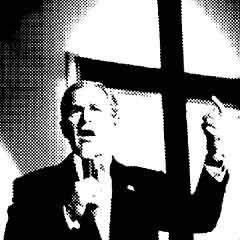|
On June 3, the Bush campaign made headlines when an email seeking to
enlist the support of 1,600 "friendly" church groups across
the country in distributing its campaign literature and registering
voters came to light. Although candidates of both parties often appear
before congregations during election seasons, federal tax laws prohibit
overt political endorsements by houses of worship, which are tax-exempt.
Defending the White House's move, presidential spokesman Steve Schmidt
was quoted by the New York Times as saying, "people of faith have
as much right to participate in the political process as any other
community."
Critics disagreed. "This is the most
shocking example of politicizing churches I've ever seen," said the
Rev. Barry W. Lynn, executive director of the watchdog group Americans
United for the Separation of Church and State, and added. "By
enrolling churches in an election scheme, the Bush campaign is
endangering those churches' tax exemptions."
Representative Bill Thomas
(R-California), chairman of the House Ways and Means Committee,
undoubtedly knew this when he introduced a provision the following week
making it easier for religious groups to back political candidates,
called Safe Harbor for Churches, to a larger bill dealing with corporate
taxes. The measure would have significantly eased tax penalties for
churches making one or two intentional political endorsements of
candidates per year, and allowed up to three "unintentional"
endorsements per year. Conveniently, the provision did not bother to
define what an unintentional endorsement would be. This in theory could
have allowed a preacher to evade IRS sanctions by claiming that the
Devil had made him urge Sunday worshippers to vote for George W. Bush.
Advocates of church-state separation
again cried foul. Rob Boston, a spokesman for Americans United,
commented in an email message that the measure was "a backdoor
attempt to legalize the politicization of houses of worship." In
response to such critics, Schmidt reiterated the president's view and
called the group's position "extreme". The full House Ways and
Means Committee bowed to the barrage of protest Safe Harbor for Churches
had drawn and voted unanimously to delete the measure.
Meanwhile, on June 8th, the Senate
Judiciary Committee's Subcommittee on the Constitution, Civil Rights and
Property Rights, invited Alabama's "Commandments Judge" Roy
Moore to testify at a hearing on alleged hostility toward religion in
America. Moore, who had been removed from his position as Chief Justice
of the Alabama Supreme Court for refusing to follow a federal court
order to remove a monument depicting the Ten Commandments from his
Montgomery courthouse, urged Congress to pass a bill before the Senate
sponsored by Sen. Richard C. Shelby, (R-Alabama), Shelby's bill would
strip the Supreme Court and district courts of their power to decide
cases against federal, state or local government officers for
proclaiming God as the sovereign source of law, liberty or government.
"Roy Moore showed blatant and utter disrespect for the Constitution
of the United States and the rule of law," responded Lynn.
"The ongoing attempts by some legislators to lionize Moore's
lawbreaking is an embarrassment to the nation."
The premise that the nation is hostile to religion is also questionable
- according to a recent Fox News poll, 92 percent of Americans say they
believe in God, 85 percent in heaven, and 82 percent in miracles.
The debate over of expressions of
faith in public continued on June 14th, when the Supreme Court in an 8 -
0 decision declined to rule on whether the phrase "under God"
should be stricken from the Pledge of Allegiance. The petitioner, Dr.
Michael A. Newdow, an atheist father of a San Francisco kindergarten
student, contended that reciting the pledge was a religious exercise in
violation of the separation of church and state. To complicate the
matter, Newdow and his daughter's mother, Sandra Banning, are not
married and live apart, and a California court has awarded the right to
decide the child's education to her mother, a Christian who wants the
girl to recite the pledge with the "under God" phrase. Citing
this, the court ruled that Newdow lacked standing to sue, leaving the
matter of the pledge undecided, though three justices made it clear they
thought nothing was wrong with the phrase. Critics accused the court of
ducking the issue, and held that a lower court had affirmed Newdow's
standing when it ruled in his favor. It was likely, observers on all
sides said, that the justices would be hearing a similar case in the
future.
List of Metroland Stories by Glenn Weiser Copyright 2004 Glenn Weiser. All rights
reserved.
|

